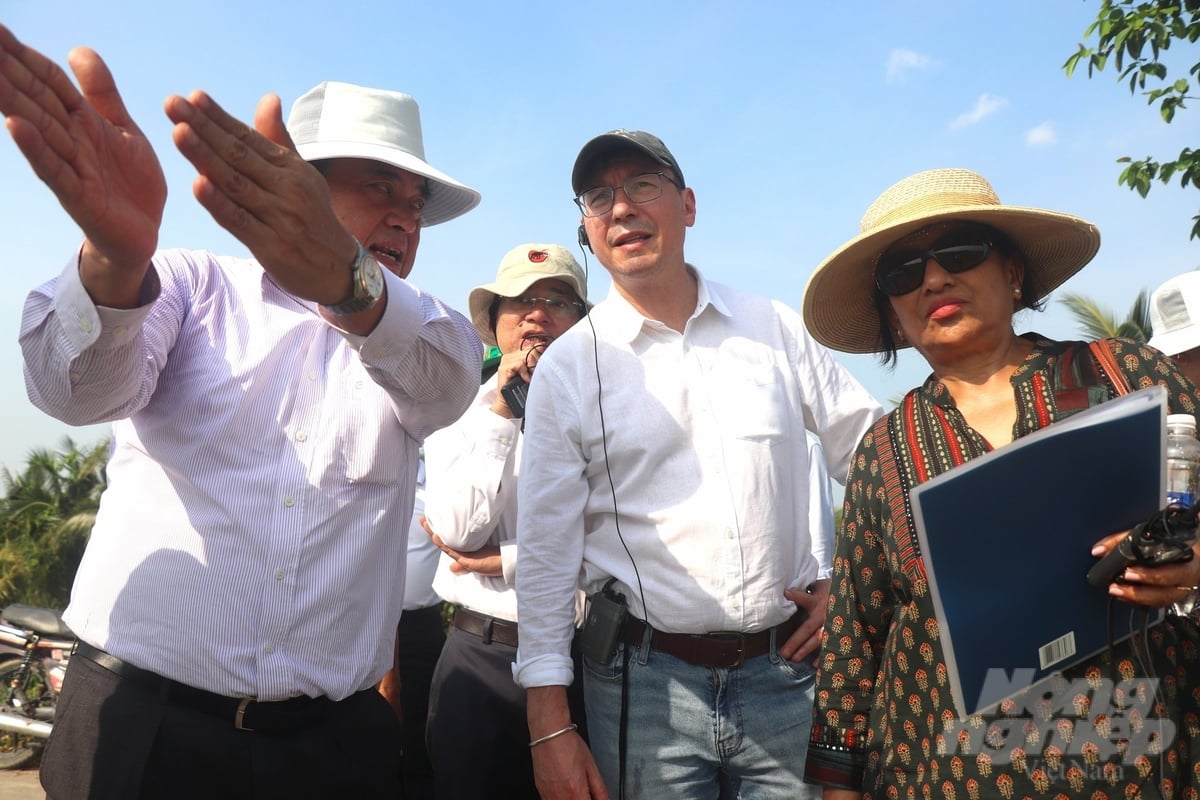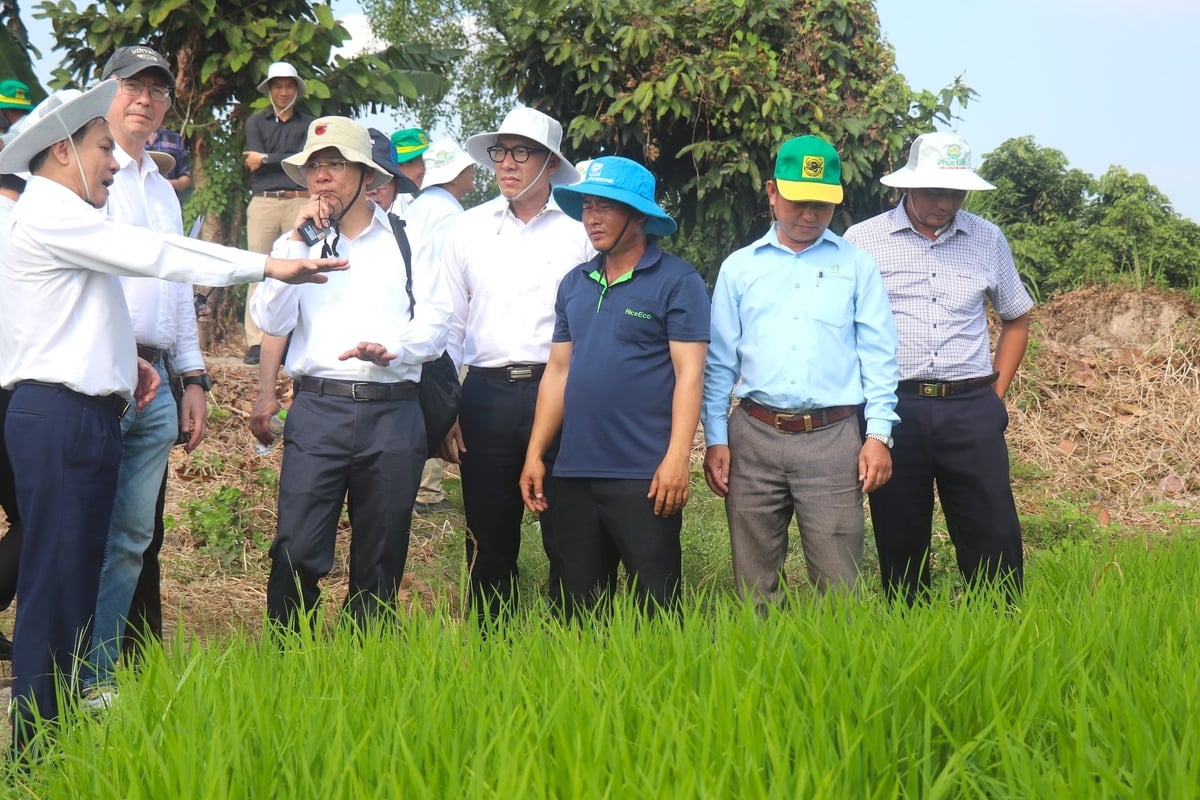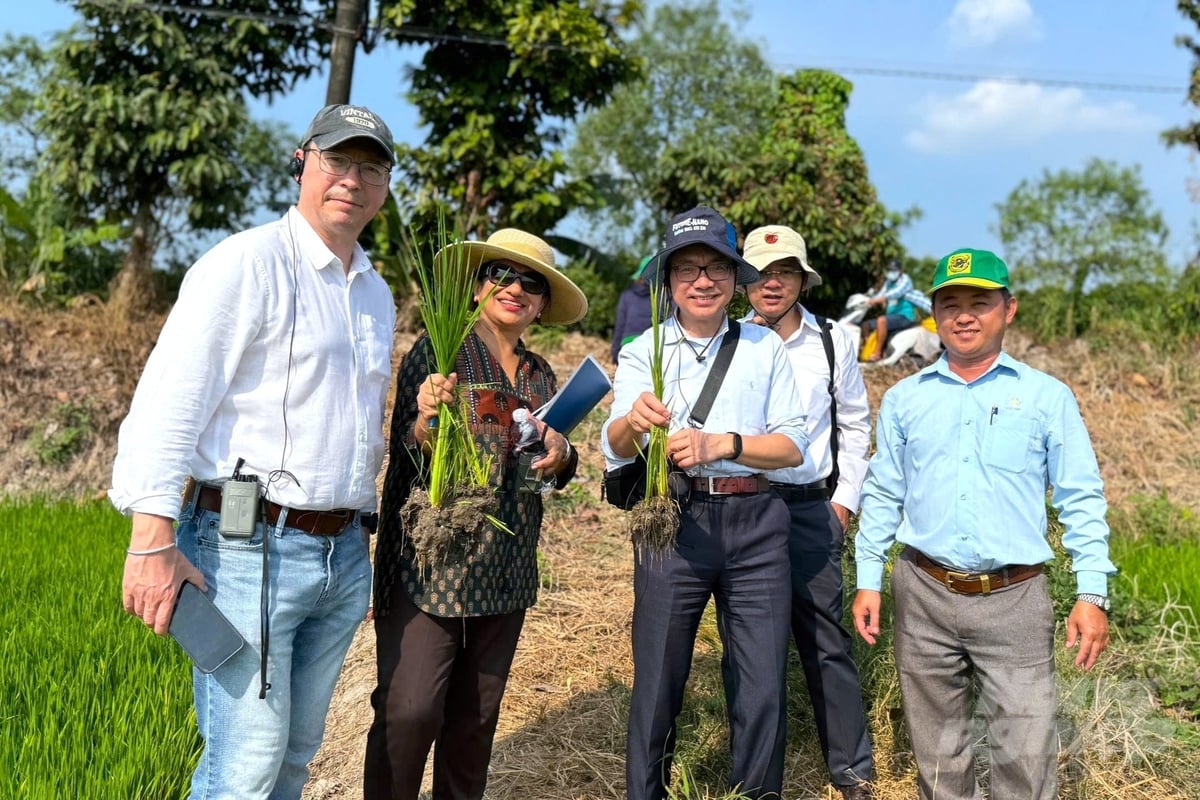November 23, 2025 | 11:16 GMT +7
November 23, 2025 | 11:16 GMT +7
Hotline: 0913.378.918
November 23, 2025 | 11:16 GMT +7
Hotline: 0913.378.918
On March 19, a World Bank delegation, led by Shobha Shetty – Global Director of Agriculture and Food, visited the high-quality, low-emission rice production area associated with the “Scheme on sustainable development of 1 million hectares of specialized high-quality and low-emission rice, attached to green growth in the Mekong Delta by 2030,” at the New Green Farm Cooperative in Thot Not district, Can Tho City.
The delegation was welcomed by Deputy Minister of Agriculture and Environment Tran Thanh Nam; Nguyen Ngoc He, Vice Chairman of the People's Committee of Can Tho City; representatives from associated units of the Ministry of Agriculture and Environment; the Department of Agriculture and Environment of Can Tho City; and the International Rice Research Institute (IRRI).

Deputy Minister of Agriculture and Environment Tran Thanh Nam (left cover) introduces to the World Bank delegation the advantages of implementing the One Million Hectare High-Quality Rice Project. Photo: Kim Anh.
Shobha Shetty, Global Director for Agriculture and Food, stated that she had received extensive information regarding Vietnam's one-million-hectare high-quality rice plan. Through this field tour, she acquired a more profound comprehension of the effort beyond perusing documentation or hearing briefings.
She asserts that the program not only enhances the application of alternate wetting and drying irrigation methods but also incorporates a circular economy model that utilizes rice straw. This strategy promotes Vietnam as an example in mitigating emissions in rice production.
Shobha Shetty, representing the World Bank (WB), expressed her support and anticipated that WB loan money will assist Vietnam in accelerating the development of one million hectares of high-quality, low-emission rice. She also committed to continuing to mobilize non-refundable funding sources to support the initiative.

Mr. Nguyen Ngoc He - Vice Chairman of Can Tho City People's Committee (left cover) introduces the emission reduction rice farming model at New Green Farm Cooperative (Thot Not District). Photo: Kim Anh.
Paavo Eliste, Regional Director for Agriculture and Food for East Asia and the Pacific, stated that the one-million-hectare high-quality rice plan has attracted considerable interest from World Bank leadership. The loan program proposal for this endeavor is approaching approval, and in the near future, the WB will concentrate on project design.
In conversations with the working delegation, Deputy Minister Tran Thanh Nam confirmed that the one-million-hectare high-quality rice plan is a primary priority of the Vietnamese government. He specifically emphasized that in 2025, despite anticipated reductions in rice prices, farmers involved in the effort will maintain confidence in production.
The Deputy Minister identified two reasons: firstly, farmers have diminished production costs, enhancing their profitability and securing stable income despite potential declines in rice prices; secondly, farmers experience security due to their connections with enterprises that procure rice at prices 200-300 VND/kg above the external market, notwithstanding price swings.

To speed up the signing of the agreement with TCAF and prepare the project proposal, the World Bank will work with the Ministry of Agriculture and Environment and the provinces and cities participating in the One Million Hectare High-Quality Rice Project from March 17-25. Photo: Kim Anh.
Owing to these practical advantages, numerous agricultural cooperatives, including those that have not yet secured investment or assistance, exhibit a strong resolve and enthusiasm to engage in the effort. Deputy Minister Nam requested the World Bank to accelerate the running of an agreement with the Transformative Carbon Asset Facility (TCAF) and to develop a project aimed at enhancing infrastructure and technological capabilities for the production of high-quality, low-emission rice in the Mekong Delta region.
The New Green Farm Cooperative, situated in Tan Hung Ward, Thot Not District, Can Tho City, presently cultivates 148 hectares as part of the one-million-hectare high-quality rice initiative for the 2025 summer-autumn season. This signifies the cooperative's fourth crop cycle in the effort, with more than 95% of farmers implementing improved rice production methodologies.
They plant seeds at a density of 80-100 kg per hectare, utilizing exclusively high-quality rice cultivars such as OM5451, Jasmine, and Dai Thom 8.
Moreover, the entirety of the farmers' rice production is secured by purchase contracts, with prices constantly above market rates by 200-300 VND/kg. The Department of Agriculture and Environment of Can Tho City, in conjunction with IRRI, is instructing farmers on the utilization of sensor technologies to assess water levels in rice fields and track methane emissions during the rice growing cycle. This model serves as a foundation for evaluating effectiveness and gradually expanding to cover the entire rice production area of Can Tho City.
USD1 = VND 25.350 - Source: Vietcombank.
Translated by Linh Linh

(VAN) Results from the Sustainable Durian Model Project in Dak Lak have confirmed the critical role of Yara Viet Nam in transferring advanced nutritional solutions to farmers.

(VAN) In Tuyen Quang province, livestock farmers have introduced effective models and innovative practices that significantly strengthen African Swine Fever prevention and control efforts.

(VAN) This is the study conducted by IRRI and Can Tho University on the rice straw value chain in Mekong Delta showing an economic potential of more than 6.6 trillion VND/year.

(VAN) By participating in cooperative economics, many farmers in Tay Ninh have overcome hardship, mastered clean dragon fruit cultivation techniques.

(VAN) The crossbreeding program in the former Binh Dinh province (now part of Gia Lai) has shown signs of decline, and urgent measures are needed to revive it and sustain past achievements.

(VAN) The agricultural sector agreed on a roadmap to pilot the MRV protocol and expand low-emission rice production from the 2025-2026 winter-spring crop.

(VAN) Agricultural extension officers in Quang Ninh do more than transmit knowledge; they have become a steadfast support system for farmers on the path to sustainable agricultural development.